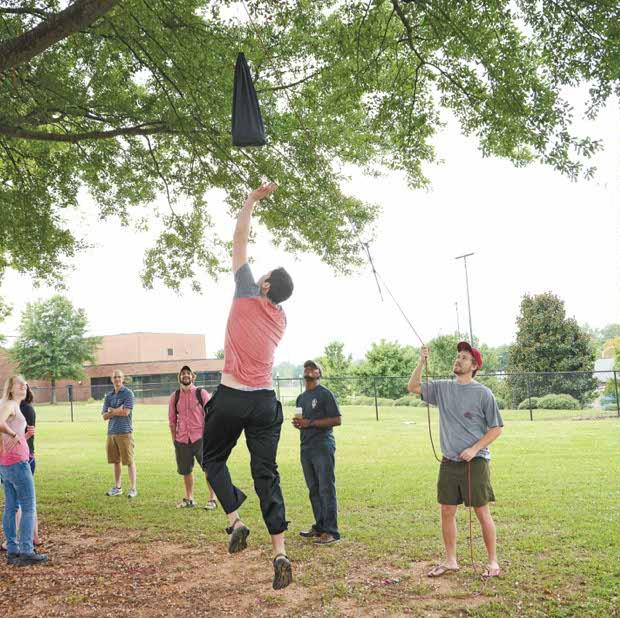Unconventional classes may seem like a way for students to lighten a class load or take a break from heavy major-related courses, but these courses have the potential to add to students’ personal and professional lives, leaving them with more than just new-found basket-weaving skills.
Julia Trippe, a senior majoring in New College, has taken several unconventional classes, including honors photography and a New College creativity class. Trippe said taking these classes has helped give her a broader perspective on creativity and creative ways to approach problems and real-world situations.
“I think [these classes] can help you learn to see the world differently and gain new perspectives on life and the world and see the details you might not have otherwise noticed,” she said. “Most of the classes are really fun so you can have a fun time [learning] as well.”
Amy Pirkle, an adjunct instructor, teaches book arts through the Honors College. In her class, students learn to create artist book structures and work on hands-on projects throughout the semester. Pirkle’s class offers students who might not otherwise be able to take a studio class a diverse, project-based experience.
“I think [the hands on experience] is a nice breath of fresh air for some students who are taking a bunch of chemistry or math or maybe they’re a chemical engineer or mechanical engineer and they’re taking all these engineering classes. It’s nice to come in and do something that’s using a different side of their brain, that’s using their hands rather than having to study for an exam or write a ten page paper or something like that,” she said.
Pirkle also said her class and other creative classes get students to try new things and approach problems in a new way.
“I think [arts classes] get you out of your comfort zone and that’s one of the most important things that can happen when you’re in college,” Pirkle said. “Even if you will never have to make another flag book or photogram accordion in your life, you’ve started thinking about things in a different way and hopefully you’ll start approaching problems in a more creative way.”
Candace Cole, a senior majoring in education, took Pirkle’s book arts class. Cole has already used skills from book arts in other classes and said the class has given her ideas for creating projects and lesson plans. She said students should take unconventional electives like book arts to broaden their perspectives and take a break from their usual classes.
“I think it is important for students to take elective classes that have nothing to do with their major or that they know nothing about initially. You never know what skills you might learn that could give you a new learning perspective,” Cole said.
Another class for hands-on learners is Outdoor Leadership, which is taught through New College. This class teaches students wilderness skills like canoeing and camping. Students are also responsible for giving a presentation on a specific skill, which helps them develop public speaking and teaching skills.
Outdoor Leadership is about more than survival skills. Students in this class are given the opportunity to push each other to excel, to teach one another and to learn through experience. Outdoor Leadership instructor Stephen Middleton, coordinator of Outdoor Recreation, said hands-on learning and teaching are integral parts of the class experience.
“What we’re doing is experiential education. It’s just a different approach to learning,” Middleton said. “You retain about 90 percent of what you try to teach others so that’s why that’s big in our curriculum.
Learning unconventional skills through atypical electives helps students develop professionally as well as personally. As an undergraduate in New College, Chris Chirino, a career specialist with the Career Center, said he took a number of unconventional classes, such as the psychology of relationships, to learn about how he communicates and interacts.
Chirino said unconventional classes give students more insight into their own values and interests and give them experiences like managing equipment, editing and managing projects, which have application in the work world.
“It is very much about the ability for a student to see the value in having a certain skill set and how it can be applied,” he said.
Chirino said while students should consult their academic advisors and make sure they remain on track to graduate, students should also learn about their elective options through the course catalogue and make room for challenging, diverse courses as well.
“[Students should] constantly keep challenging themselves so that they are always having that sort of momentum to keep thinking critically,” he said. “A key competency that employers are looking for is a diverse mindset and the ability to keep going with themselves to have independent thought.”









